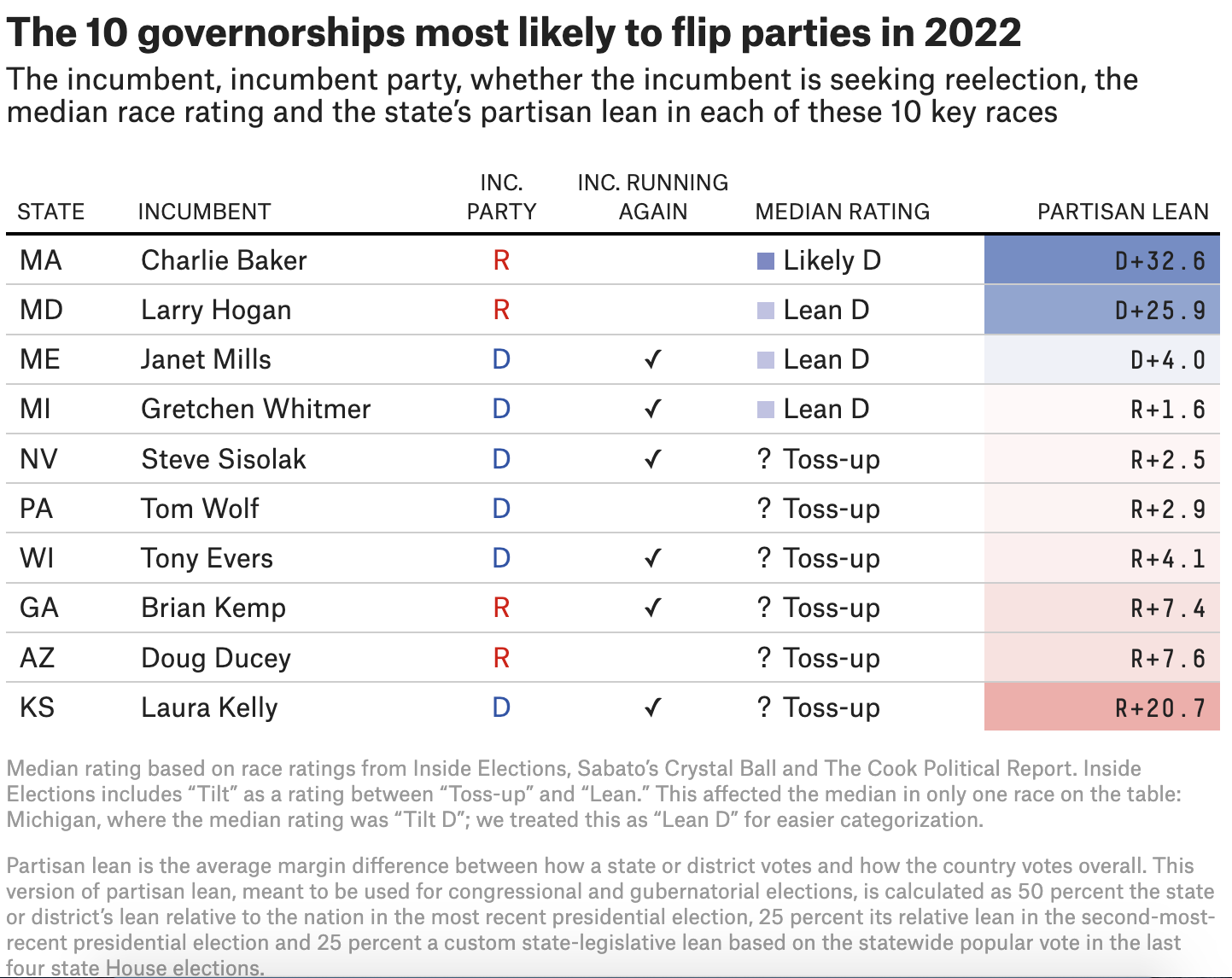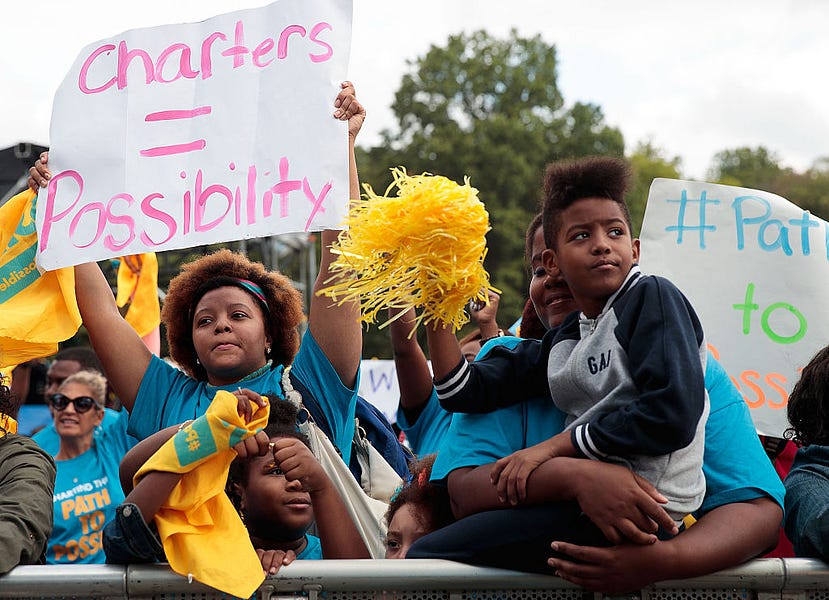A Republic, If You Can Keep It
Symbiosis, Explained
Checking In on the Governors
Hard to improve on Geoffrey Skelley’s write-up in FiveThirtyEight on which states might see their governorships flip. With so much focus on the House and Senate, sometimes it’s easy to forget the governors’ mansions—even as we see the power that a Ron DeSantis or Greg Abbott has to control the national political conversation. At the end of the day, though, who can really claim victory if Democrats retake Maryland and Massachusetts and Republicans take Kansas, which at this point is still the most likely scenario unless and until David Perdue pulls out a surprise win in the Georgia primary over Brian Kemp … and even then?
(T)he two most likely seats to flip may be Maryland and Massachusetts, where popular Republican governors are leaving office, and the GOP could end up nominating candidates who struggle to appeal in those deep-blue states. Meanwhile, primary battles in Michigan, Nevada, Pennsylvania and Wisconsin could also hurt GOP efforts to capture Democratic-held governorships. After all, while gubernatorial races have become more nationalized, voters still show a greater tendency to break from their baseline partisan preferences in these races than in contests for Congress, meaning a poor nominee can still cause the seemingly favored party to stumble.
That said, even though Republicans have two of the toughest seats to defend this cycle, they also have their own juicy target in Kansas, the reddest state Democrats control. Moreover, Democrats hold more highly competitive seats, which could easily flip. Based on early race ratings data from Inside Elections, Sabato’s Crystal Ball and The Cook Political Report, we’ve identified 10 states that are especially competitive, six of which Democrats currently control. This list could certainly change, but at this point, the GOP is playing on friendlier turf, as the table below shows.

Polling, Revisited
I don’t know Harry Enten, but he’s quickly becoming a must read for me when it comes to data-based reporting. From one of his recent write-ups for CNN:
Biden won Black voters by less than 80 points – the weakest margin for a Democratic presidential nominee since 1996 (if your baseline is the network exit polls).
A few weeks ago, Gallup released results comparing Biden’s approval rating since October with the first six months of his administration. Much attention has been paid to his 20-plus-point drops with young adults and Hispanics.
Far less noted was that Biden’s approval rating among Black adults stood at a mere 67%. That was down 20 points, from 87% at the beginning of his presidency, which was fairly in line with the percentage of Black voters who backed him in 2020.
First of all, that’s just a very smart thing to keep an eye on. Of course, it doesn’t mean those voters will back Republicans or even that they won’t vote to reelect Joe Biden. But softness in any voting bloc as central to the Democratic base as black adults can create a crisis within a party. Somebody will see that crisis as an opportunity and follow Rahm Emmanuel’s advice: “You never want a serious crisis to go to waste. And what I mean by that is an opportunity to do things that you think you could not do before.”
Unlike turnout efforts that are dedicated to getting someone to vote rather than stay home, getting a voter to switch parties is actually worth two points. You get the vote and you deprive the other party of a vote. But it’s hard. Republicans have been trying to target black voters for decades with next to nothing to show for it.
But there is an increasing number of issues in which black Democratic voters look different than white Democratic voters. Low approval ratings plus wedge issues could finally be a recipe for some small success.
School choice has been an obvious go-to for Republicans as Democrats have stayed tight with the teachers unions. But now Democrats have a growing divide within their own party. During the Trump administration, white Democratic voters were quickly becoming more hostile to school choice. Sen. Bernie Sanders, for example, called for a moratorium on public funding for charter school expansion. But the same wasn’t happening among non-white Democrats. “Support for charters looks reasonably strong and stable among black and Hispanic Democrats, but it looks weak and is plummeting among white Democrats,” wrote Jon Valant, the director of the Brown Center on Education Policy for the left-leaning Brookings Institution.
You can find a similar trend on social issues and—important to our current conversations—abortion. Here’s just a few data points to consider:
-
“Hispanic millennials hold the most conservative views on abortion among their white, black and Asian counterparts.” From a 2015 poll reported by NBC.
-
“Black non-Democrats are still less liberal on abortion than are Black Democrats, and in turn, Black Democrats are still less liberal than non-Black Democrats.” From a 2020 Gallup survey.
-
“In 2015, 64 percent of black Democrats thought abortion should be legal, and in 2017 that number had only moved to 66 percent. That’s a 2-percentage point swing compared to white voters’ almost 9-point swing during the same two years.” From FiveThirtyEight.
-
“One issue where black Democrats differ from other Democrats is same-sex marriage: 88% of white and 76% of Hispanic Democrats say legal same-sex marriage is a good thing for society, compared with a significantly smaller share of black Democrats (52%).” Pew survey reported in 2020.
-
“A 55% majority of black Democrats say ‘it is necessary to believe in God in order to be moral’ … By contrast, a large majority of white Democrats (89%) and a narrower majority of Hispanic Democrats (57%) say a belief in God is not necessary to be moral.” Pew survey reported in 2020.
-
“Roughly two-thirds of Progressive Left (68%) are White, non-Hispanic, by far the largest share among Democratic-aligned groups.” Pew survey reported in 2021.
-
“In the 2020 election, Mr. Trump made larger gains among all Black and Latino voters than he did among white voters without a college degree.” Democratic data firm Catalist in 2021.
So where does this leave the Democrats in 2022? Here’s Democratic strategist Julie Roginsky’s take:
“My fear continues to be that sometimes we as Democrats run on things that we wish the voters cared about, rather than what the voters do care about. Is [abortion access]] something they lose sleep over every night? No. What they do lose sleep over is, ‘I can’t fill up my gas tank, it’s really expensive. I can’t afford to send my kid to college, it’s really expensive.’ … Any voter who will vote purely based on [Roe] is an incredibly committed voter who will be coming out in the midterms, anyway.”
Audrey is back with more on the Pennsylvania Senate race, with a close look at Trump’s latest rally with Republican candidate Dr. Oz:
Trump Stumps for Dr. Oz in Pennsylvania
GREENSBURG, Pennsylvania—In January of last year, the New York disco band Village People let out a sigh of relief when President Donald Trump left office, telling Billboard that the former president’s “abusive use” of their music “has finally ended.” But now more than a year after leaving the White House, Trump has found that the band’s “Y.M.C.A.” is still a crowd pleaser at his rallies—rain or shine.
His recent campaign event at the Westmoreland Fairgrounds in Greensburg, Pennsylvania, was no exception. “What weather!” the former president said Friday evening to a large crowd of his supporters, most of whom were decked head-to-toe in mud-spattered Trump gear after waiting for hours to hear him speak. “We’re gonna have a lot of fun, Pennsylvania, we’re gonna have a lot of fun.”
Rally attendees trekked through pools of mud, a soggy field of parked cars, and a maze of “Get Your Trump Gear Here!” pop-up stands selling knick-knacks splattered with MAGA monikers: “Deplorable Damn Right” read one sticker, “The Final Variant is Called Communism” read another. Closer to the arena was a giant jumbotron projecting Trump’s “official” donor livestream—$25 from Joe A. of Mississippi, $45 from Elizabeth W. of Arkansas, $500 from Connie M. of Ohio—its electric blue screen contrasting with the backdrop of Friday evening’s dark and cloudy sky.
As soon as Trump took the stage he launched into a freewheeling speech about inflation—“I got gas way down to $1.87 a gallon!”—the war in Ukraine—“when I was there, [Putin] would never have done it”—the Russia probe—“It was a fake con job”— and even J.D. Vance, who last week won the Republican primary for U.S. Senate in Ohio— “He’s a great hot celebrity!”

Anyone arriving in the middle of Trump’s speech was hard-pressed to figure out what most reporters thought was the main purpose of the event—to boost support for Dr. Mehmet Oz, Trump’s hand-picked candidate for U.S. Senate in Pennsylvania ahead of the Republican primary on May 17.
Only 45 minutes into his speech did Trump finally get to the point. “His show is great,” Trump said of the celebrity heart surgeon who recently canceled The Dr. Oz Show in his bid to succeed retiring GOP Sen. Pat Toomey. “He’s in the bedrooms of all those women and telling them good and bad.” Trump then invited Oz onstage, where he delivered a vague one-minute speech about the Biden administration’s failures before letting Trump take back the floor. “The only thing Joe Biden has built back better is the Republican Party,” Oz said.
Trump’s shout-out was long-anticipated: Both Oz and his only real Republican challenger, David McCormick, spent months before the primary ingratiating themselves with the former president at his Palm Beach resort, Mar-a-Lago, in a bid for his endorsement. (The New York Times reported that McCormick’s wife, Dina Powell McCormick, showed Trump a picture of Oz next to people wearing full head coverings in a private meeting to emphasize Oz’s Turkish American heritage and Muslim upbringing. McCormick denied the claims.)
As McCormick now knows all too well, unsuccessfully gunning for Trump’s approval can come at a cost. If you win his endorsement, as Oz did in early April, you could experience a boost in the polls, as Vance did in the days leading up to last week’s Ohio Senate primary. (Oz now leads McCormick by roughly 2 points, according to RealClearPolitics’ polling average.) But failing to score the endorsement runs you the risk of being ridiculed by the former president for trying.
As of Friday, McCormick now falls into the second camp. “If anybody was within 200 miles of me, he hired them,” Trump said of McCormick, the former Bridgewater CEO and George W. Bush administration Treasury official whose campaign hired a handful of high-profile Trump staffers—including Hope Hicks and Stephen Miller—in a failed bid to curry favor with the former president. Friday evening, Trump told the crowd that McCormick “may be a nice guy” but that he is “totally controlled” by Senate Minority Leader Mitch McConnell and simply isn’t “MAGA” enough to fit the bill.
Chief among Trump’s concerns was McCormick’s criticism of the former president’s actions leading up to the Capitol riot on January 6, 2021. “He did want my endorsement very badly, but I couldn’t do it,” Trump added. “David came out very strongly against me on numerous occasions—this is before he was going to run. All of the sudden he said, ‘Boy, I like this guy a lot.’”
Click here to read the rest.









Please note that we at The Dispatch hold ourselves, our work, and our commenters to a higher standard than other places on the internet. We welcome comments that foster genuine debate or discussion—including comments critical of us or our work—but responses that include ad hominem attacks on fellow Dispatch members or are intended to stoke fear and anger may be moderated.
You are currently using a limited time guest pass and do not have access to commenting. Consider subscribing to join the conversation.
With your membership, you only have the ability to comment on The Morning Dispatch articles. Consider upgrading to join the conversation everywhere.